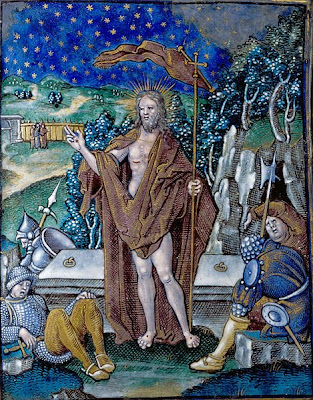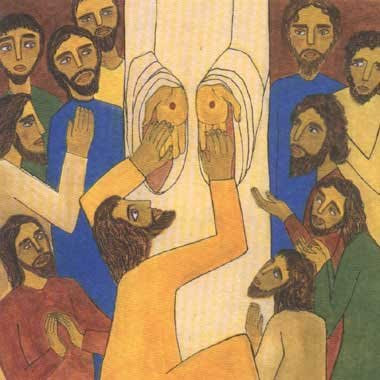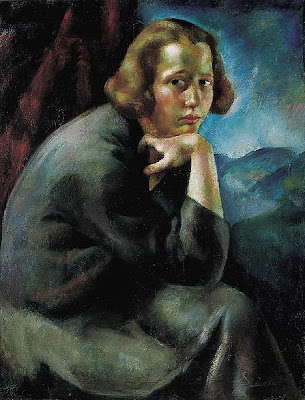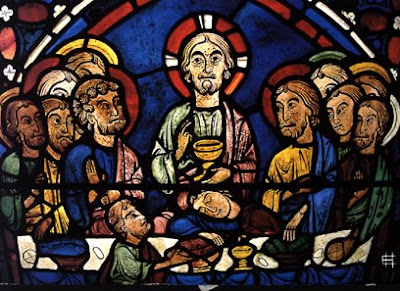Thursday, April 30, 2009
Wednesday, April 29, 2009
Fullness
 Artist: Paul Cézanne
Artist: Paul Cézanne Image from Wikimedia Commons
The fullness of joy is to behold God in everything.
God is the ground, the substance,
the teaching, the teacher, the purpose, and the reward for
which every soul labors.
Tuesday, April 28, 2009
Christ-light
I will hold the Christ-light for youin the shadow of your fear;I will hold my hand out to you,speak the peace you long to hear.
Monday, April 27, 2009
The light of your soul
I discovered John O'Donohue during one of my many trips back to Ireland where I once had the delightful privilege of living. It saddens me that I never got to hear him in person before his untimely death. But I have some of his tapes. They are all such an extraordinary celebration of life!
May the light of your soul guide you.
May the light of your soul bless the work
You do with the secret love and warmth of your heart.
May you see in what you do the beauty of your own soul.
May the sacredness of your work bring healing, light and renewal to those
Who work with you and to those who see and receive your work.
May your work never weary you.
May it release within you wellsprings of refreshment, inspiration and excitement.
May you be present in what you do.
May you never become lost in the bland absences.
May the day never burden you.
May dawn find you awake and alert, approaching your new day with dreams,
Possibilities and promises.
May evening find you gracious and fulfilled.
May you go into the night blessed, sheltered and protected.
May your soul calm, console and renew you.
I love the line, "May you be present in what you do." Clearly the words of a contemplative, a meditator.
Sunday, April 26, 2009
God as defense advocate
The psalm appointed for this morning's principal service is Psalm 4 which begins like this:
Answer me when I call, O God, defender of my cause; *It is a good prayer for me right now because I am certainly "hard pressed" and in need of a "defender of my cause". I imagine that's true for many right now - perhaps even some who may happen to read this post.
you set me free when I am hard-pressed;
have mercy on me and hear my prayer.
Saturday, April 25, 2009
Reaching the Kingdom
The image of crossing a river at death in order to reach the life to come is common to many, many belief systems. Here we see how it is understood by a great Christian master of the pschology of prayer:
If your understanding is that heaven is not only available to us after death but that we enter it in the here and now, then we cross that river many, many times during our lives. Let us be willing to see how beautiful that is.And I saw the river
over which every soul must pass
to reach the kingdom of heaven
and the name of that river was suffering:
and I saw a boat which carries souls across the river
and the name of that boat was love.
Friday, April 24, 2009
"Anchored in the love of God, open to grace"
Today I found myself spending time with some of the English mystical poets - Donne, Herbert, Traherne - and I found these lines at the end of a longer poem:
I am His image, and His friend,I'm so struck by the poet's delighted, unselfconsciously gender-mutable celebration of how he, himself, is viewed by God. The poem is Love by Thomas Traherne and you can read all of it right here. Also, please take a look at the Church Times article entitled "I delight in all, and all in me" for more about Traherne and the stained glass window shown above.
His son, bride, glory, temple, end.
Thursday, April 23, 2009
St. George's Day
It's St. George's Day and also Shakespeare's birthday. And so it seems fitting to offer you these lines from Shakespeare's Henry V, Act 3, Scene 1, l. 31:
I see you stand like greyhounds in the slips,And here's something about the legend of St. George that you might like to know:
Straining upon the start. The game's afoot:
Follow your spirit; and, upon this charge
Cry God for Harry, England and St George!'
All stuff to think about!The familiar version of the story is found in the Legend Aurea of James of Voraigne. The story is as follows:
"For some time a terrible dragon had ravaged all the country round the city of Selena in Libya, making its lair in a swamp. Its breath caused pestilence whenever it approached the town. So the people gave the dragon two sheep every day to satisfy its hunger, but when the sheep were all gone, a human victim was necessary. Lots were drawn to determine the victim and they fell upon the king's daughter. She was led, dressed as a bride, to the edge of the swamp. There St George chanced by and asked the maiden what she was doing alone in such a place. She told him of the dragon and urged him to leave, but he would not. When the monster appeared he made the Sign of the Cross and pierced it with his lance. He asked the maiden for her girdle and binding it round the dragon's neck led it. meek as a lamb, to the maid, who took it to the city. St George told the people to have no fear, but to be baptized, and bidding them to honour the clergy and pity the poor, rode on about God's business."
The first thing to notice about this version of the legend is that St George is not reputed to have slain the dragon. He overcame it and brought it to heel so that in future it served the city it had tormented. There is a clear allegorical meaning. The city is a man, the king is his reason, which ought to rule over the passions, the princess is his soul and the dragon is the instincts and desires of the flesh. If the instincts are not governed by reason they threaten the soul. At first they may be placated with small things, but growing stronger by these concessions they eventually threaten the immortal soul itself. St George on the white horse symbolizes the Grace of God, which if it is accepted enables the soul to master the flesh, the desires and faculties of which are then brought meek and controlled into their proper service of the whole man.
The story is therefore an allegory of man's life and destiny, his fall and his salvation.
Wednesday, April 22, 2009
Happy Earth Day!

How anybody can read that psalm and then conclude that we humans have the right to exploit and trash the earth for our own monetary profit is beyond me.1 The earth is the LORD's and all that is in it, *
the world and all who dwell therein.
2 For it is he who founded it upon the seas *
and made it firm upon the rivers of the deep.
Please, folks. The resources are out there. Read up, educate yourselves, get some inner clarity that a little sacrifice for the greater good is beneficial for all of us! Then take action in whatever way that is possible for you.
Tuesday, April 21, 2009
Pilate's question
Years ago I read a book called The Laughter of God: At Ease With Prayer by Miriam Pollard. I don't have a copy any more so I can't vouch for the exact accuracy of this quotation, but at one point the author says something like this: "It is not necessary to bludgeon a person with every truth you know." People often use truth (in its literal sense) to wound others. Here's a description of how that works:
Perhaps we need to ask Pilate's quesiton, "what is truth". Not in a cynical sense but in an open, spacious, inquiring way.“Malicious truth gloats like a conqueror. Loving truth mourns that it must confront and show a brother his error. Malicious truth struts at its power. Loving truth weeps to find that the correction it inspires may for a while cause great pain. Malicious truth cries ‘Checkmate, you are beaten!’ Loving truth whispers, ‘I correct you with the same pain you feel. But when the pain is over, we shall rejoice that honesty and love have been served.’”
Monday, April 20, 2009
The way to transformation
It is perfectly true that we die with him in baptism and rise from the dead: but this is only the beginning of a series of deaths and resurrections. We are not “converted” only once in our life but many times, and this endless series of large and small “conversions,” inner revolutions, leads finally to our transformation in Christ.
--Thomas Merton from Life and Holiness
Sunday, April 19, 2009
Low Sunday

Well, today is Low Sunday. Also known in the Eastern Churches as "Thomas Sunday" and among Roman Catholics as "Divine Mercy Sunday" because of so-called "Doubting Thomas" who insisted he must see and feel the wounds of the Risen Christ before he will believe in the Resurrection.
Here is an interesting take on that story:
A very tragic but all-too-common judgment that is afoot in the Church today goes like this, "If your experience of Jesus is not the same as my experience of Jesus then you're not really a Christian.'' Low Sunday should cure us of that attitude once and for all!In fact, Thomas’s answer, "My Lord and my God!" is the high point of John’s Gospel. When Thomas gets it, he gets it. No one else has offered such devotion or named Jesus as God. Thomas holds out for an experience of Jesus on his own terms until he finds his terms made foolish by the reality of seeing Jesus. Only then does he make his statement of faith.
Thomas has to make this personal connection with Jesus for himself. Mary can’t experience the resurrected Jesus for the disciples, and the disciples can’t experience Jesus for Thomas. It is faith, not doubt, that holds out for one’s own experience of Jesus.
Bonus image:
Saturday, April 18, 2009
The contemplative option
I really, really love this single sentence:
You can see a little bit of the context right here.Contemplation is a choice about what we will have on our minds.
~ Loretta Ross
Wednesday, April 15, 2009
Luminous, wonderful
Holy Spirit,
giving life to all life,
moving all creatures,
root of all things,
washing them clean,
wiping out their mistakes,
healing their wounds,
you are our true life,
luminous, wonderful,
awakening the heart
from its ancient sleep.~~ Hildegard of Bingen (trans. by Stephen Mitchell)
Tuesday, April 14, 2009
The REAL perfection
It was probably around 1987 or so that I came across a little book entitled Abandonment to Divine Providence by Jean Pierre de Caussade. I don't know if my spritual director had recommended it or whether it came to my attention some other way. I just know that my paperback copy lived in my handbag for at least two years and became quite battered and dog-eared during that time. I still have that copy and all my underlinings remind me of what I was experiencing in those days and still experience (albeit with different material) today.
Here is a quotation. May it gladden your heart and console your spirit:
You are seeking God and he is everywhere. Everything proclaims him to you. He is by your side, over you, around and in you. Here is his dwelling and yet you still seek him. Ah! You are searching for God, the idea of God in his essential being. You seek perfection and it lies in everything that happens to you—your suffering, your actions, your impulses are the mysteries under which God reveals himself to you.
Monday, April 13, 2009
Monday in Easter Week
From Psalm 16 - one of the psalms appointed for today:
My heart, therefore, is glad, and my spirit rejoices; *Somehow this really seemed to go with the image I've reproduced above!
my body also shall rest in hope.
Sunday, April 12, 2009
Easter Day

A class of fourth graders lumbered up the aisle with a stuffed teddy bear twice the size of the gift-bearers. The bear then reclined serenely against the altar, facing the congregation. After the liturgy an irate parishioner phoned, appalled at the liturgy and especially the smiling teddy bear, and kept repeating, "It was a total surprise" that "simply did not fit in." After a few forays on my part into the themes of God's love for all creation and gratitude over the enthusiasm of children, the teddy bear remained insurmountable. Finally, with some resignation, I said, "You are absolutely right, it was a total surprise and simply did not fit in; but neither does resurrection from the dead."
Saturday, April 11, 2009
Holy Saturday
Do you think Christ is just lying in the tomb today waiting for tomorrow morning? Oh, no! He has descended to the dead in order to preach to those in prison and liberate captives!
It is customary to represent Christ in paintings on walls, as He descends, appears before hell, clad in a priestly robe and with a banner in His hand, with which He beats the devil and puts him to flight, takes hell by storm, and rescues those that are His. Thus it was also acted the night before Easter as a play for children . . . . He descends with the banner, shattering and destroying the gates of hell; and we should put aside thoughts that are too deep and incomprehensible for us.
-- Martin Luther (1533)
You can read a fascinating paper on this called "The Harrowing of Hell: Filling in the Blanks" by The Rev. Peter Burfeind right here. It is from a Lutheran point of view.
Friday, April 10, 2009
Good Friday
For whatever reason, God chose to make man as he is - limited and suffering and subject to sorrows and death - he had the honesty and the courage to take his own medicine. Whatever game he is playing with his creatures, he has kept his own rules and played fair.
Thursday, April 9, 2009
Maundy Thursday
I had the astonishing good fortune to stumble upon a Maundy Thursday sermon by Martin Smith today. Here's an excerpt but I really encouage you to click through and read the whole thing:
The Eucharist is the action of a man who has only one last hour to finally get across to his baffled companions what his life meant. They hadn’t gotten it. They hadn’t understood. He faced certain death and he had only an hour left, and nothing but his bare hands and the food on the supper table. What can you do with a loaf of bread and cup of wine when that is all there is to get through the defenses of these stolid and uncomprehending men? Men who right to the end had been arguing about who should get the chief positions in the new regime, one on Jesus’ right and the other on his left?For everyone who is feeling vulnerable right now - in the sense of truly feeling unsafe - let this holy vulnerability be a source of consolation for you.
He took the bread and wine and told them to take them to be his very self. And Jesus had no ‘self-defense,’ only self-giving. Self-giving was the only self he had. So if they took the broken bread to be his broken self, and the poured-out wine as his life-blood willingly shed, then they were receiving himself, the only self he had. In accepting his self-giving, they would receive himself.
...and we cannot receive him at all without becoming vulnerable ourselves. What could be more risky than to allow Christ to be himself, within us?
Wednesday, April 8, 2009
Wednesday in Holy Week
I am so moved by the Eucharistic readings for today for they all speak pointedly and profoundly to my current difficulties.
Do click through and read them all if you have a little time. They are quite short and will only take you a few minutes.
There is one line from the Epistle reading that penetrates even more that the others:
And here's something else that gives me consolation today:Consider him who endured such hostility against himself from sinners, so that you may not grow weary or lose heart.
- From Hebrews 12
Solitude does not necessarily mean living apart from others; rather, it means never living apart from one’s self.-- Parker Palmer from A Hidden Wholeness
Monday, April 6, 2009
Monday in Holy Week
Mary took a pound of costly perfume made of pure nard, anointed Jesus' feet and wiped them with her hair. The house was filled with the fragrance of the perfume. - John 12:3
Some words come to mind for me here:
extravaganceI'll probably think about others throughout the day.
courage
devotion
yearning
boldness
gratitude
determination
autonomy
radical hospitality
risk
subversive
sacrifice
nurturing
Sunday, April 5, 2009
Palm Sunday
The earliest creed is much more about fidelity than it is about doctrinal formulas. The lordship of Christ is about his authority in the life of the Christian rather than that person's beliefs about the particularities of Christ's nature:
The confession ‘Jesus is Lord” is at once the earliest Christian creed and an acknowledgment of Jesus’ divinity and sovereignty. Paul used that designation only three times in his letters and each time with worshipful sincerity and awe. The other two are found in Romans 10:9 and 1 Corinthians 12:3. This was said to be the essential confession each convert repeated at baptism. All the Philippians had made this same confession. All later creeds of the Christian church derived from it. There was - and is - nothing more that needs to be said as a statement of faith.
For Paul, and for the Philippians too, this would have been the utmost in civil disobedience and high treason. In those times the only person for whom this could be said was Caesar himself. “Caesar is Lord” was the oath taken by every Roman citizen. For all time, this confession “Jesus is Lord” commits the one who says it sincerely to a life in which Jesus reigns supreme and so lives day by day to fulfill the will and purpose of God.
Saturday, April 4, 2009
That wonderful word: "And"
It is worse than you think it is and you are freer than you think you are. The powers are raging beyond your control and they are already overcome in Christ. The division is an uncrossable spiritual chasm and it’s been crossed.
Friday, April 3, 2009
"Thou fool!"
The following story has an unknown author so I give it to you in its entirety:
Hot sun. Salty air. Rhythmic waves.
A little boy is on his knees scooping and packing the sand with plastic shovels into a bright blue bucket. Then he upends the bucket on the surface and lifts it. And, to the delight of the little architect, a castle tower is created.
All afternoon he will work. Spooning out the moat. Packing the walls. Bottle tops will be sentries. Popsicle sticks will be bridges. A sandcastle will be built.
Big city. Busy streets. Rumbling traffic.
A man is in his office. At his desk he shuffles papers into stacks and delegates assignments. He cradles the phone on his shoulder and punches the keyboard with his fingers. Numbers are juggled and contracts are signed and much to the delight of the man, a profit is made.
All his life he will work. Formulating the plans. Forecasting the future. Annuities will be sentries. Capital gains will be bridges. An empire will be built.
Two builders of two castles. They have much in common. They shape granules into grandeurs. They see nothing and make something. They are diligent and determined. And for both the tide will rise and the end will come.
Yet that is where the similarities cease. For the boy sees the end while the man ignores it. Watch the boy as the dusk approaches.
As the waves near, the wise child jumps to his feet and begins to clap. There is no sorrow. No fear. No regret. He knew this would happen. He is not surprised. And when the great breaker crashes into his castle and his masterpiece is sucked into the sea, he smiles. He smiles, picks up his tools, takes his father's hand, and goes home.
The grownup, however, is not so wise. As the wave of years collapses on his castle he is terrified. He hovers over the sandy monument to protect it. He blocks the waves from the walls he has made. Salt-water soaked and shivering he snarls at the incoming tide.
"It's my castle," he defies.
The ocean need not respond. Both know to whom the sand belongs...
I don't know much about sandcastles. But children do. Watch them and learn. Go ahead and build, but build with a child's heart. When the sun sets and the tides take - applaud. Salute the process of life and go home.
I so remember as an undergraduate in philosphy class hearing the professor expound on the New Testament parable of "bigger and better barns". The builder takes satisfiaction in his work and the harvest he has gathered. Then he says, "Soul, take thine ease."
And I also so remember the professor's truly thundering voice when he quoted God's reply: "Thou fool! This night thy soul shall be required of thee."
I guess it was a lecture on existentialism or something. Hmmm. Maybe epicurianism. Not sure. But, I'm telling you, you could have heard a pin drop in that lecture hall.
And, as you can tell, it made a permanent impact on me!
I would suggest that it behooves us to respect and appreciate the princple of impermanence.
Thursday, April 2, 2009
Wonderful encouragement
Somehow, this seems to go with the Chávez quote I posted yesterday:
Refuse to fall down.
If you cannot refuse to fall down,
refuse to stay down.
If you cannot refuse to stay down,
lift your heart toward heaven,
and like a hungry beggar,
ask that it be filled,
and it will be filled.
You may be pushed down.
You may be kept from rising.
But no one can keep you
from lifting your heart
toward heaven.
Wednesday, April 1, 2009
Something about the baptismal covenant

Sojourners sent this quotation out today. What Chávez is saying here is so, so focused, so radiant with clarity, that it inspires me greatly. I think I will post it on all three blogs because it speaks to the theme and purpose of each one:
Remember that the baptismal covenant requires us to respect the dignity of every human being. It does not say "every human being except oneself." Think about it.The first principle of nonviolent action is that of noncooperation with everything humiliating.
 Photo from Wikimedia Commons
Photo from Wikimedia Commons



 Image from Wikimedia Commons
Image from Wikimedia Commons Christ Before Pilate
Christ Before Pilate


 Artist: Erzsébet Korb
Artist: Erzsébet Korb 

 Resurrection of the Dead
Resurrection of the Dead



 Window by Meyer's Studios, Munich
Window by Meyer's Studios, Munich 


 Blue Heaven Mandala
Blue Heaven Mandala